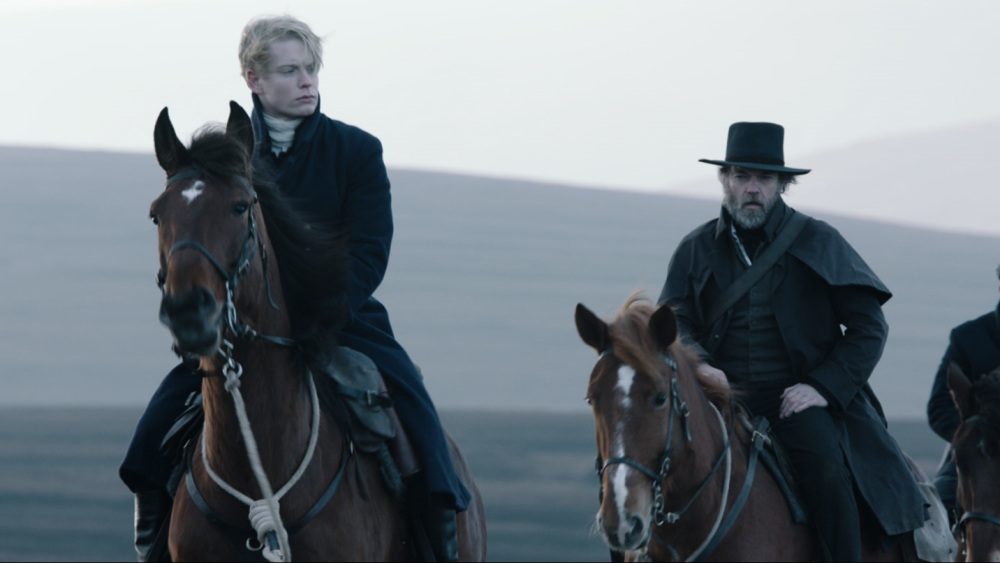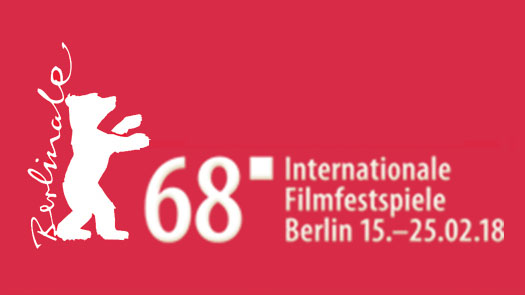Black 47: An interview with Hugo Weaving, James Frecheville and director Lance Daly

Black 47 is a harrowing portrayal of the Irish potato famine told through the guise of a Western revenge picture and is showing at this year’s Berlinale. We spoke with director Lance Daly and the film’s stars Hugo Weaving and James Frecheville about telling this story.
What motivated you to tell this story?
Lance Daly: It’s essentially the most important story in Irish history. The Irish famine from 1845 to 1852 and nobody had ever made a film that explored that world or told that story before. There’s a lot of scope of interest outside Ireland in the world in this period. A lot of people know a little about the potato famine but nobody really knows the intricacies of it and Hugo was already interested in playing the part of Hannah even before I joined so that was another big incentive.
Hugo Weaving: It feels to me that one of the difficulties of making this film is that the effects of what happened in 1847 are still being felt in Ireland. It’s quite hard to make a feature film about something that’s still very present, quite hard to envision it when the effect is still so palpable. Would you say that’s right, Lance?
LD: It’s true. In fact Ireland is the only country in Europe that has a lower population now than it did in 1847. It’s amazing to think that this was 170 years ago but in fact its happening now, its just somewhere else and the complacency exists in exactly the same way.
How did you come about using the action-Western genre to tell this story?
LD: I think it’s hard to find a way into the story and the initial angle we had was someone returning home to [the famine] or entering it for the first time. The few stories I have heard about people trying to make a movie about the famine were focused more on the people who had to endure those conditions. When you focus on the famine alone, you focus on people’s suffering and that becomes an arthouse movie, only allowing a certain number of resources. Not enough to stage what we wanted to stage. We resolved that equation by turning to the revenge genre, which has it’s own challenges: who is out for revenge? Who is to blame?
At the same time, it was vital that the violence would not be gratuitous it needed to be contextualised by the conditions of the period. It was a crucial part in propelling the narrative and keeping the audience rooted in the present moment.
How did you prepare for your roles Hugo and James?
HW: I think the basis for both our characters was a deep trauma from their time serving the British army in Afghanistan. They are damaged characters, who would never be able to return to normality. Physically, we all had to learn horse riding on a professional level. I was doing a lot of it in Australia but I had hurt my back just before shooting so when I arrived in Ireland, I had to take a break before shooting. We also did musket training to learn how to load and fire these antique weapons.
James Frecheville: I stopped shaving. I stiff-armed most auditions that had come my way because I really wanted this project to happen. I learned horsemanship; I clocked 20 hours of horse riding before I even confirmed the role because, if I had waited, I would have already fallen too far behind. I’m glad I did put in the time because it was essential to my character to be absolutely comfortable on the horse.
I admire your decision to use the Gaelic language in the film. I feel like a lot of other directors would have just used English to make it more marketable. What was the role the language played in the film and some of the challenges that arose?
LD: Authenticity is part of it. It was important to demonstrate that plenty of Irish people, at the time, could not speak English or refused to speak English. So I think that had to be represented but also there’s an underlying tension in the story between the English and Irish language and between the imposition of British culture on Ireland and trying to choke that language out of existence. 1847 is not really recorded in cinema or in audio form, there’s not much documentation left, so it’s about creating a different world or time that you can believe in.
JF: I had an immense challenge. To do those scenes in a language I had never even heard. It was technically too difficult to produce certain sounds that don’t exist in English at all but I had some great teachers to help me make sure it was realistic. It’s a huge responsibility to take on a role like that and to be the character that people project their hearts onto.
Who are your main influences as a director?
LD: It’s such a long list. I’d have to think about which directors are particularly relevant for any given film. I’m more interested in the film than the director because I think the director’s ego, voice and obsession with branding can get in the way of the film itself, a lot of the time. I kind of suspect there’s another level to the craft than branding that depends on what the film is and finding the aesthetic that suits that. In regards to [Black 47] there were a lot of American filmmakers that were important obviously because of the Western genre: Sam Peckinpah and Robert Aldrich came to mind. We had to pull certain aspects of the Western because we were focusing on masculinity that has to find a way to survive in this inhospitable environment. But also Kurosawa was an influence just for how the characters and the story interact with the landscape. Are there any films that you think influenced Black 47?
I would say Django Unchained, funnily enough. Although they’re not stylistically similar, I got this sense of revisiting a painful part of history and correcting a wrong in this fantasy revenge sense.
HW: I think that’s interesting because I see a lot of that in Australia with aboriginal filmmakers who are focused on this idea of fantasy revenge. I don’t mean they’re in the fantasy genre but there’s a deep-seated need to express some sort of justice, righting a wrong of some hideous crime.
Excellent, thanks so much for your time!
Sean Gallen
Black 47 does not have a UK release date yet. Read our review here.
Read more reviews and interviews from our Berlin Film Festival 2018 coverage here.
For further information about the event visit the Berlin Film Festival 2018.

























Facebook
Twitter
Instagram
YouTube
RSS